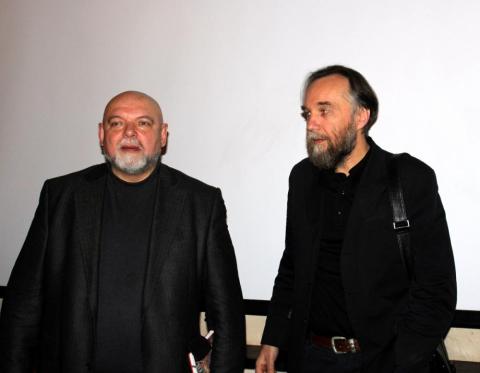Notes on Thought
Primary tabs

Everyone “thinks” that they can think and that what they are usually doing is called “thinking.” This is a misconception.
Those who have a certain culture of thought and are capable of self-reflection enter (I hope, consciously and responsibly) into what are virtually mechanical process of circulating certain schools, trajectories, and systems. They dwell there, following the main semantic rules and canons. In the best case, they can change, add to, correct, or amend something in this system, but certainly nothing fundamental. This is how dissertations teach “to think” – that is, of course, when they are honestly, thoroughly, and independently conceived and written. But this does not yet mean “thinking.” This is a preparatory stage, sometimes an important one, but it is far from the ultimate goal. Moreover, this does not necessarily lead to thought. In a number of cases, such might even become a block on the birth of thought. Moreover, one can think without such.
The first case is associated exclusively with those who have in one way or another consciously devoted their lives to science and culture and to everything connected to such. These are the “programmers” of thinking, and sometimes the hackers.
The second case includes everyone else. They have no conscious moment of entering into an organized and structured intellectual environment. They remain in ignorance with respect to where they are from and what it is that revolves inside their head and how such is organized. These are the ordinary users of thinking, who use ready-made programs without wondering about their algorithms. Here “thought” is understood to be the fragments of random inferences and instances of scattered and unsystematized knowledge and formulas whose origins remain unknown (to this “thinker”), the free recycling of rational calculations, all of which is continuously attacked by the sheaf of invasions of the unconscious, which lend to thinking a sinister, corporeally-saturated character. The latter aspect has been the subject of pyschoanalysis, for which the very process of thinking is a projection of the game of irrational corporeal forces barely covered with pseudo-rational nonsense. Subjectivity here is a random combination of complexes which were firmly established in early infancy and remain fundamentally unchanged. That is, everything that a person “thinks” about over the course of their life is simply a detailed, lifelong history of pain and anamnesis.
The second case – that of banal consciousness – is not thought at all, but the waste of the bodily machinery. The first is an act of belonging to a higher, but also completely alienated system, in which there is no subjectivity in sight. We can see a hint of this in the recognition of humanists that their discourses and all the discourses they hear are instances of quoting. Postmodernism takes this reflection to the point of absurdity and turns it into a new mental illness that converges with the idiocy of banal consciousness.
One could, of course, propose mixed variables as well, such as those of the “semi-intellectual” or “semi-layman” (the consumer), but such yields nothing new: only an advanced idiot or a mentally retarded intellectual. The alienation is not changed. We are outside of thought. We do not think, but rather participate in an alienated, mechanical process – some clearer, others dimmer.
Where is thought? On a different plane. Thought is born and comes into being in a completely different dimension. Compared to what we are doing when (it seems to us that) we are “thinking”, it is something radically other. The experience of thought means the collapse of everything we usually take such to mean. Thought can begin only when what we make thought out to be is finished. Both everyday delirium and intellectual “scholarly citations” are barriers to the birth of thought. They should be abolished. Thought is born out of the moment of madness or nonsense, when the rotation of the gears of both everyday and scientific consciousness is suddenly stopped. In the face of death, this feels good. But not for everyone. Pseudo-thinking reliably protects us from death by barricading against the very possibility of experiencing it with countless instances, fears, calculations, plans, and hopes (for doctors, miracles, police, common sense, science, and the “light at the end of the tunnel”). Everything is subject to death, but death is the lot of the chosen. Death is intimately connected to thought. Thought is born only in the face of death. That which is born freely and horribly in the face of death, when everything else that we have held “thought” to be has been destroyed – that is real thought. Only at this moment does subjectivity make itself known, having been in all other cases dissolved amidst the alienated fields of unfocused consciousness.
Thought requires colossal, superhuman effort to overcome the fundamental threshold.
Thought is incredibly difficult. It is a feat. At the same time, it is transformative illumination. It is not merely some particular, sublime thought, but just thought, thought as such – one could even say “any” thought, taking into consideration the root for “love” (in Russian: liubov’) in the word “any” (Russian liubaia). Thought is not the creation of systems or doctrines, which are consequences, and not necessary ones at that. The main aspect of thought is not its results and manifestations, but thought itself, its being. Thought irreversibly changes anyone who as at least once approached it. Thought gives us the first view of who it is that is thinking, i.e., the subject. But it is not us. It is the radical other in us. Someone hidden inside. To think means to present the possibility of emerging out of the inner darkness into the inner light.
